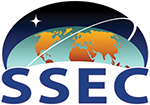NASA Gives Wisconsin Space Grant Consortium Designated Status
Madison, WI, September 12, 2002—NASA has conferred Designated status on the Wisconsin Space Grant Consortium, a NASA program to encourage space-related education, research and public service. Wisconsin’s Consortium (WSGC) is now one of 28 of the 50 state consortia to achieve Designated status. Consortia in Wisconsin, Nebraska and Oklahoma were given special status this year.
“Designated” status confers additional budget and program opportunities. Tom Achtor, WSGC’s Associate Director for Research and Executive Director for Science at UW–Madison’s Space Science and Engineering Center, said that the new status brings a “significant expansion of existing programs. It means larger grants to more students.” New status roughly doubles funding for the Green Bay-based WSGC.
As a major research university, UW–Madison has been a key partner in WSGC. One-third of student research support flows here from WSGC. That support may increase by two to three times under designated status, Achtor said. He stressed that the Consortium fosters collaboration among the member institutions. He noted that WSGC research grants have allowed professors at UW–System campuses to work regularly with counterparts in Madison when they could benefit from their resources and facilities.
As an example, Achtor said that the UW Madison’s Department of Astronomy was able to make time on the WIYN telescope on Kitt Peak available to faculty and students in the Consortium. This opportunity allowed students around the UW System to use telescope time for their research.
Twenty-four colleges, universities, corporations and nonprofit organizations belong to the WSGC. They include Ripon and Lawrence colleges, seven UW–System institutions and Orbital Technologies Corp., a Madison company with a space-related mission.
Space grant consortia were created by congress in 1987 in the 50 states, the District of Columbia and Puerto Rico. Through NASA fellowships and program and research support, all enhance the training of scientists and engineers at the university level, and provide teacher training in precollege education, said Frank Owens, director of NASA’s Education Division.
For past features and columns, see SSEC’s News page.
